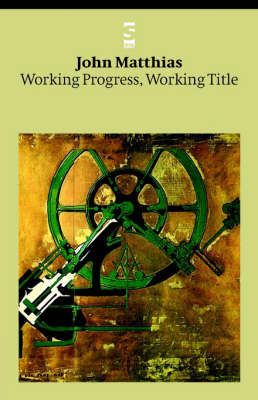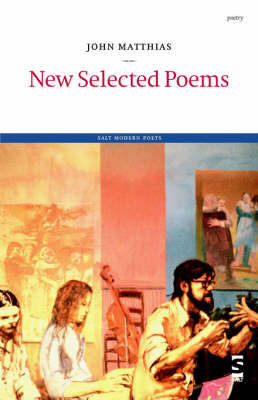Salt Modern Poets
3 total works
Kedging is John Matthias's first book of poems since his long New Selected Poems of 2004. The volume is divided into five parts: "Post-Anecdotal" includes short poems on autobiographical and elegiac themes; "The Memoirists" engages the lives and writings of Lorenzo Da Ponte, Edward John Trelawney, Frederick Rolfe, Celeste Albaret, and Vernon Duke; "The Cotranslator's Dilemmas" deals with Swedish poets, Swedish poems, and issues of translation; "Laundry Lists and Manifestoes" ranges from Homer and the Old Testament to Internet technology; "Kedging in Time" deals with the lives of several families in the context of British naval history; and "The Back of the Book" prints an essay called "Kedging in Kedging in Time," which was commissioned by Chicago Review as a commentary on the final poem in the volume. The three extended sequences in the book underline the observations of Mark Scroggins in a review of New Selected Poems - that Matthias, working in the tradition of late modernism, but in middle-length poems that are not open-ended, has "written one Briggflatts after another." Robert Archambeau has said that Matthias writes "successfully in a wider range of styles than any other contemporary poet." John Kinsella has said simply that Matthias is "a great poet."
"One of the best poets in the USA." - Guy Davenport
Working Progress, Working Title combines two of John Matthias’s most experimental poems. Critics have for some time written of Matthias as a poet of place, but what will be made of his “Automystifstical Plaice”? The poem in fact derives from the strange fact that film siren Hedy Lamarr and avant-garde composer George Antheil collaborated on a patent for a radio-directed torpedo in the early days of World War II when both had gone to Hollywood. But the piece is also about the Paris avant-garde, early experimental films like Ballet mecanique and L’Inhumaine, Antheil's early scores, Hollywood in the 1940s, spread-spectrum technology, artificial intelligence, and many related matters. The narrator seems to be Claire Lescot, who steps out of L’Inhumaine and follows Antheil and Lamarr to Hollywood. The second and longer poem, Pages: From a Book of Years, is a kind of manic attempt at remembering in the context of the poet’s mother’s loss of memory to Alzheimer’s disease. The years happen to be 1959, 1941, 1953, 1961 and 1966, all years of great personal significance to the poet, but also years in which the public world intersected the private world in unusual ways. Matthias’s father collected yearbooks on a wide variety of subjects. Materials from these yearbooks, along with the poet’s high school yearbook which he hadn’t seen for forty years, propel themselves into the world of these poems as the poet cleans out the family home and writes his pages, abruptly ending each one at the bottom of his computer screen.
John Matthias’s New Selected Poems brings together both short and longer poems from eight previous books. It ranges from early lyrics written in America during the 1960s to meditative and epistolary poems deriving from his years spent in England during the 70s and 80s, formal experiments engaging issues of poetics, and sequences like Northern Summer, Facts from an Apocryphal Midwest, A Compostela Diptych, and Cuttings. Robert Duncan called his early poetry “the work of a Goliard – one of those wandering souls out of a Dark Age in our own time,” and Guy Davenport has said that his recent work makes him “one of the leading poets in the USA.” The present volume, together with Working Progress, Working Title, published by Salt in 2002, makes almost all of his major work available in Britain for the first time in many years.


